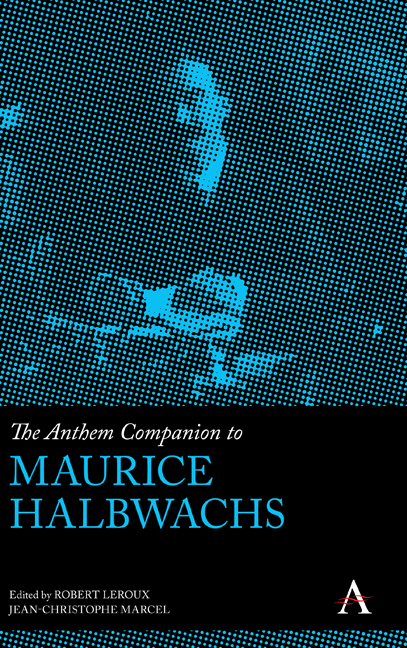Book contents
- Frontmatter
- Contents
- Introduction
- Chapter 1 A Theorist of Collective Memory
- Chapter 2 Halbwachs and the Durkheimian Perspective on History
- Chapter 3 Maurice Halbwachs, Sociologist of Memory: His Reception in Italy and the Development of the Sociology of Memory
- Chapter 4 Population as the Body of Society
- Chapter 5 Urban Morphology and Social Morphology: Marcel Roncayolo and the Work of Maurice Halbwachs
- Chapter 6 Halbwachs’s Leibniz and Halbwachs’s Sociology
- Chapter 7 Halbwachs on Quetelet and the Use of Statistics in Sociology
- Chapter 8 Maurice Halbwachs and the Sociology of Consumption and Social Classes
- Chapter 9 From Criticism of Moral to the Probalistic Test
- Chapter 10 The Age Criterion: Between Sociology and Biology
- Chapter 11 Speculation: Order or Disorder?
- List of Contributors
- Index
Introduction
Published online by Cambridge University Press: 23 February 2022
- Frontmatter
- Contents
- Introduction
- Chapter 1 A Theorist of Collective Memory
- Chapter 2 Halbwachs and the Durkheimian Perspective on History
- Chapter 3 Maurice Halbwachs, Sociologist of Memory: His Reception in Italy and the Development of the Sociology of Memory
- Chapter 4 Population as the Body of Society
- Chapter 5 Urban Morphology and Social Morphology: Marcel Roncayolo and the Work of Maurice Halbwachs
- Chapter 6 Halbwachs’s Leibniz and Halbwachs’s Sociology
- Chapter 7 Halbwachs on Quetelet and the Use of Statistics in Sociology
- Chapter 8 Maurice Halbwachs and the Sociology of Consumption and Social Classes
- Chapter 9 From Criticism of Moral to the Probalistic Test
- Chapter 10 The Age Criterion: Between Sociology and Biology
- Chapter 11 Speculation: Order or Disorder?
- List of Contributors
- Index
Summary
Louis Maurice Halbwachs was born in Reims on March 11, 1877. He entered the famous French “great school,” the Ecole Normale Superieure (ENS), reserved for the best pupils, in 1898. He left the ENS in 1901, after having gained the “aggregation,” the French highest degree for teachers. While teaching philosophy in high schools, he became in 1905 a member of the Année Sociologique (journal founded by Émile Durkheim) team, probably under the influence of his friend François Simiand. As members of the Socialist Party, they both belonged to the Groupe d’Études socialistes, a study circle attended by other Durkheimians like Durkheim's nephew, Marcel Mauss. In the division of labor established among the Durkheimians for the journal's publishing, he specialized in reviewing works of economic sociology, statistics, and later demography. During the Great War, he worked at the War Ministry under the leadership of his friend Albert Thomas, a well-known socialist political leader. Afterward, he was appointed as lecturer at the University of Caen in 1918, and then became a full professor at Strasbourg from 1919 to 1935. Entering the Sorbonne at this date, he first replaced Celestin Bougle, another famous Durkheimian, and was appointed full professor in 1937. In 1944 he obtained a chair of “Collective Psychology” at the College de France, the most prestigious French college. Halbwachs was arrested by the German Gestapo in July 1944, probably because his son belonged to the French Resistance, and also because he had previously been protesting at the German Komandantur, after his in-laws have been murdered by the French Milice. He was finally deported to Buchenwald, where he died on March 16, 1945.
For a quarter of a century now, and more particularly over the last decade, Maurice Halbwachs has inspired a growing literature embodied by many sociologists and historians of social sciences, published for the most part in scientific journals, focusing on the sociological thought that Halbwachs developed in his writings. Then come many studies that emerge from the history of ideas and epistemology: these are entirely devoted to a particular facet of Halbwachs's work, either to place it in its scientific context or to discuss it on the basis of fundamental cognitive issues.
- Type
- Chapter
- Information
- The Anthem Companion to Maurice Halbwachs , pp. 1 - 4Publisher: Anthem PressPrint publication year: 2021



